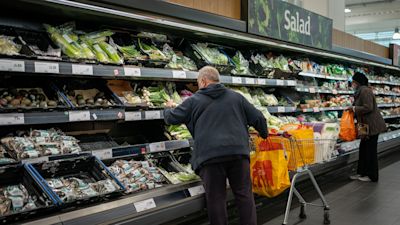Exclusive
Fruit and veg prices predicted to rise in UK when new post-Brexit controls bite

Counting the cost of Brexit: Fresh fruit and vegetable prices predicted to rise, ITV News Economics Editor Joel Hills reports
The price of many fruits and vegetables on sale in the UK is predicted to rise again when new post-Brexit import controls are introduced later this year.
The government is due to start bringing in new paperwork requirements for EU businesses sending animal and plant products to the UK from next week, with physical inspections beginning in April.
Border checks have been postponed five times since the EU-UK Trade and Cooperation Agreement came into force in January 2021, due to concerns they would push up prices and fuel inflation.
Food importers and Dutch flower growers have already warned the burden of the extra administration will impact the price, choice, availability and shelf-life of goods on sale in the UK.
Yesterday, the Department for Food and Rural Affairs (DEFRA) updated its website and unexpectedly reclassified many fruit and vegetable consignments from the EU as “medium risk” from “low risk” for the purposes of the Border Target Operating Model (BTOM) from 31st October.
The Fresh Produce Consortium (FPC) says this decision will add £200 million to the cost of imports.
“These increased costs will apply in October and be passed straight on to consumers,” Nigel Jenney, CEO of the FPC, told ITV News “and they are a threat to the viability of numerous small businesses”.
Fresh Produce Consortium chief Nigel Jenney told ITV News 'many of the UK's favourite fruits will be hit by import hikes'.
Nearly half of what we eat in the UK comes from abroad and nearly two-thirds of that comes from the EU, according to the Food Standards Agency - although the exact proportion changes according to the season (we import more in the winter), trade agreements (tariffs and quotas can affect the flow of food) and economic conditions (the strength of the pound, the level of inflation and consumer demand).
According to the Fresh Produce Consortium, the reclassification of fruit and vegetables as “medium risk” from the end of October means the “vast majority” of consignments will require extra paperwork.
The new controls will apply to peaches, strawberries, apples, peaches, pears, tomatoes, blueberries, grapes, and some vegetables such as sweet potatoes and carrots.
Exporters in the EU will have to complete Phytosanitary Certificates (a sort of health certificate), which will be signed by a health official.
Those certificates must then be lodged by the importer on DEFRA’s “Import of Products Animals, Food and Feed System” (IPAFFS) to notify the enforcement authorities in the UK.
Separate Phytosanitary Certificates may be required for individual suppliers and/or for produce from different countries of origin.
Once the paperwork is done, the HGVs may be selected for inspection at Border Control while en route to the UK.
Even if the produce is not diverted for inspection, a “Common User Charge” (entry charge) will be levied per the Phytosanitary Certificate pre-notified in IPAFFS.
The charge is estimated to be between £20 - £43 but the government has yet to confirm the precise details of the fee and how it will be applied.
As it stands, the FPC says 65% of the lorries which arrive in the UK carry mixed loads of goods (what’s known as “groupage” in the industry).
The FPC says these lorries are more likely to be inspected, meaning potential delays for smaller importers who find their goods affected.
It argues the annual cost of the extra paperwork and delays of £200 million a year could be significantly reduced if the government allows businesses to conduct their own official inspections, subject to regular monitoring. “The system is not fit for purpose,” Jenney told ITV News ”I doubt there are enough officials in the EU to generate the volume of Phytosanitary Certificates which are going to be required.”
According to the Food and Drink Federation, the UK imported £3 billion of vegetables in 2022, 79.4% of which came from the EU.
In the same year, fruit imports stood at £4.5 billion, 39.7% of this came from the EU.
The most popular imports were tomatoes, peppers, cucumbers, grapes, apples and bananas (which are not covered by the new controls).
The largest EU import markets were the Netherlands, Spain and France.
“The announcement by Defra, that it will require Phytosanitary Certificates for a significant proportion of the fruit and veg arriving from the EU, is utter madness,” says Steve Cock, a director at The Customs House Ltd.
“Whilst this will not add significantly to the costs associated with moving a lorryload of a single product to a supermarket, it will be highly inflationary for businesses that move smaller often mixed consignments,” he added.
A government spokesperson said: “We are committed to delivering the most advanced border in the world. The Border Target Operating Model is key to delivering this, protecting the UK’s biosecurity.“We have introduced these import controls to support businesses and ensure the efficient trade of fruit and vegetables is maintained between the EU and Great Britain.
"We are taking a phased approach – including temporarily moving all medium risk goods from EU, such as fruit and vegetables, to low risk to ensure business do not face any unnecessary burdens. We will continue to work closely with businesses across the UK as the controls are implemented.”
Want a quick and expert briefing on the biggest news stories? Listen to our latest podcasts to find out What You Need To Know…